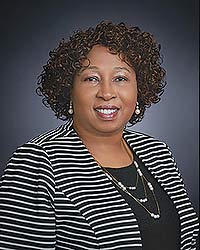 Jane Irungu will join the Utah State University executive cabinet as the school’s first vice president of diversity, equity and inclusion. Her hiring was announced following a six-month national search. Jane Irungu will join the Utah State University executive cabinet as the school’s first vice president of diversity, equity and inclusion. Her hiring was announced following a six-month national search.
“We want to ensure Utah State is a place where all people feel they belong and can thrive,” said President Noelle E. Cockett. “Dr. Irungu has years of experience working with students, faculty and staff in strategic leadership roles, as well as being a teacher. We’re excited to bring her to USU and confident she’ll be an effective leader.”
Irungu has been serving as the associate provost of inclusive excellence at the University of Oklahoma. Her previous roles have included interim vice president for diversity, equity and inclusion and chief diversity officer for that university, as well as assistant vice president in the division of equity and inclusion and director of the Center for Multicultural Academic Excellence at the University of Oregon.
At USU, Irungu will be the university’s executive-level strategist responsible for guiding practices and creating opportunities to define, assess and promote inclusive excellence, access and cultural proficiency for students, faculty and staff
“The opportunity to lead USU in this important role gives me a measure of excitement but also an awareness of the hard work ahead of us,” Irungu said. “I appreciate that there are many ongoing DEI initiatives at USU’s different campuses, and I look forward to working with university leadership, faculty, staff, students and other stakeholders to take us to the next level.”
 The creation of the vice president position was a top recommendation from the Diversity and Inclusion Task Force created by President Cockett in spring 2019. That task force has also made recommendations on the university’s approach to diversity, equity and inclusion, which Irungu will review before leading the university in creating a strategic plan. The creation of the vice president position was a top recommendation from the Diversity and Inclusion Task Force created by President Cockett in spring 2019. That task force has also made recommendations on the university’s approach to diversity, equity and inclusion, which Irungu will review before leading the university in creating a strategic plan.
In June 2021, USU released results from its first diversity and inclusion survey in 2019. The survey found that students with an underrepresented identity status reported a lower sense of belonging on campus. In addition, students with a disability, LGBTQIA+ students, students of color and international students reported feeling less safe in the classroom and found USU to be less welcoming. Complete survey results are at diversity.usu.edu
Irungu is looking forward to stepping into her new role on July 1. “I would like to start by learning more about USU’s vision for a diverse, equitable and inclusive community,” she said. “There is enthusiasm and commitment to inclusion, and with a collaborative approach – a shared sense of purpose and responsibility – I believe we can collectively continue the advancement of a caring and welcoming community for all.”
For more information on diversity, equity and inclusion at USU, visit usu.edu/about/diversity-and- inclusion.
|